Safest weed killer for lawns (clover and other weeds)
Hi,
My main lawn weed appears to be clover. I have a small townhouse yard, but the clover started spreading all over my front yard. I used Round up directly on the infected areas at the beginning of the season and then patch seeded the areas. That worked ok, but I have a new patch of clover and I don't want to go through that trouble again. I have been looking at products like Ortho weed killers that are safe for lawns, but I really would like to use whatever is the safest chemical.
So the question is, what is the safest product I can use on my lawn that won't hurt the grass and will kill a broad range of weeds (expecially clover). I'd like my children to be able to play on the grass a couple of days later without worrying about dangerous residual chemicals.
Thanks,
Viche
Comments (97)
viche
Original Author19 years agolast modified: 9 years agoWell its been almost two weeks after Nematode and Milky Spore application and the grubs are just fatter and still kickin. I applied 10 million Hb in the proper manner to a 220 square foot piece of lawn.....twice the normal dosage and it had no affect as far as I can tell. I put milky spore ever 2.5 feet and extra on the edges of the brown spots. I know the stuff takes time to spread, but you'd think it would do something if I pour it directly over the area where the grubs are munching. GrubX is calling my name and it's getting louder and louder. This is the second year that I've tried bio-controls and they are doing nothing.
viche
Original Author19 years agolast modified: 9 years ago"I really think that if you looked at a lot of healthy lawns, you would see there are other plants in there besides grass, but when you mow at a good height, it looks uniform and lush. My lawn is about 50% grass and looks as good as my neighbors."
Well you can tell when all you have is clover because the clover is so low to the ground that you really don't cut off many of it's heads when you mow it.
Related Professionals
Deer Park Landscape Architects & Landscape Designers · Folsom Landscape Architects & Landscape Designers · Braintree Landscape Contractors · Canton Landscape Contractors · Dallas Landscape Contractors · Florham Park Landscape Contractors · Fort Atkinson Landscape Contractors · Huntley Landscape Contractors · Inglewood Landscape Contractors · Lynn Landscape Contractors · Ringwood Landscape Contractors · Rockville Landscape Contractors · Tustin Landscape Contractors · Westchester Landscape Contractors · Wethersfield Landscape ContractorsThe_Dollmaker
19 years agolast modified: 9 years agoMilky spore does not always work immediately. SOmetimes it's months. Sometimes it will not kill the grub at all, just keep it from becoming a beetle next spring. If you want grass and only grass, you are going to have to either poison the turf or go hydroponic like the golf courses do.
viche
Original Author19 years agolast modified: 9 years agoDollmaker,
Ahh..... great segway. What DO the golf corses do to have perfect grass? I always assumed that they used tons of chemicals, pesticides, and herbicides....is this not so? What do you mean by hydroponic and is this the method that most gold courses use?
Thanks!
The_Dollmaker
19 years agolast modified: 9 years agoI don't golf, so I don't see many courses, but I have talked to a landscaper who maintains a few in Maine. It's not cheap but at least it won't give your dachshund cancer.
Here is a link that might be useful: Hydroponic turf
viche
Original Author19 years agolast modified: 9 years agoWell hate to tell you this but, the golf courses seem a lot more dangerous than my neighbor's lawns. From that website you sent me:
"To this mix is added a variety of herbicides (to kill weeds that try to move in), pesticides (to control insect damage) and fungicides (to control disease) to help keep the grass perfect.
Once the green is established, you start in on maintenance. This includes daily mowing with a precision green mower, watering, fertilizing, applying chemicals, aerating, and general coddling."
Guess I'll stick to trying to achieve a decent looking lawn instead of a golf-course quality lawn. You know, I did read an article on merit (Grub-X) showing the studies done with it. Even when they fed it in mass amounts to animals, there were barely any ill effects. It is broken down within a few days to stuff like carbon dioxide and water as well. Maybe if I apply it only around the brown areas and stay off the lawn for a week, I'll be ok.
The_Dollmaker
19 years agolast modified: 9 years agoI was thinking you would not need all the poisons on a home lawn because hand-pulling would take care of the weeds.
Jonesy
19 years agolast modified: 9 years agoI don't understand the "Safe" chemicals thing, none are safe. I just saw in the news this week that the insides of our HOMES are in the top 5 most toxic places to be. Because of the chems we clean with.
Jonesy
19 years agolast modified: 9 years agoI am sorry, don't mean to hurt anyone's feelings, and spike can pull this if he wants, I am on a rant here. I don't use chems on my lawn or shrubs except for bagworms on my evergreens. I don't kill anything unless I have to. That includes gophers, moles, grubs....I think nature's way is the best. When I am left with total care of my home and yard which will be soon, the yard will be last on my list of priorities. In the spring I see many yards covered with lovely purple flowering weeds, or yellow with dandelion blooms, what does it hurt. It's all in the eye of the beholder. When we walk we see a yard that is all natural, rocks, cactus, wildflowers and bermuda growing all through it, who cares. If the owner likes it more power to him. My neighbor/friend gets out every morning with buckets and picks up the balls her sweet gum drops on the ground over night. What a waste of time. I like clover, my uncle had a clover lawn in Calif, it was called dicondra or something like that. Mow it twice a year. I guess I sound frustrated and I am, because I know about priorities, my husband has alzheimers. The orig poster needs to be thankful she only has clover to worry about.
viche
Original Author19 years agolast modified: 9 years agoDolley- no weed picking for me....herniated disks, remember?
Jonesy. First of all I'm not a she. Secondly, why try to save your evergreens? Let nature do its thing....it's best that way right? Who cares if they are damaged or look unhealthy, or even if they die? Something else will surely grow there. Obviously I'm joking. I agree that "it's all in the eye of the beholder" and what the owner likes, but mine is the eye which beholds, and I don't like what I see. I'm sorry to hear that your husband has alzheimers, but you really don't know what I have to worry about in my life. Besides, worries shouldn't stop anyone from doing what they want to do. Once we give up setting and achieving goals, no matter how small, it's all over. Isn't that why you still fight the bagworms?
The_Dollmaker
19 years agolast modified: 9 years agoOh I hear ya on the back thing. I have arthritis and I can't kneel at all. I do a lot of weeding from a low lawn chair and I make sure there is a cane nearby to help me get up out of it. (at the ripe old age of 45! My mother is more physically fit than I am!:P) I took an awesome class at Maine Garden Day this year from a lady with MS. She showed photos of how she tools around on her Jazzy (a sit-down scooter can be had from Pep Boys for a few hundred bucks, versus thousands for the jazzy) She lengthened all her tool handles with PVC and she looks like a polo player when she's weeding. Another alternative - can you get someone to pull it out for you or dig up that section of turf, then go over it with grass seed? It's a constant battle, but even for people who use poisons, it is a constant battle. If you do invest in a scooter, she says to make sure it has a wide floor so it won't short out or get tangled in wet grass.
The_Dollmaker
19 years agolast modified: 9 years agoP.S. Viche, why didn't I think of this before - if you mentioned a budget I did not see it, but what if you dig the whole thing up and replace with rolled turf, then start using corn gluten meal 4 times a year? It stops seeding. The only thing I have not found it to stop is oxalis (yellow wood sorrell), which was already firmly established in my yard for many years. Even runner-ing weeds would have to seed in first before spreading, unless you have neighbors with a lot of creeping charlie etc.
viche
Original Author19 years agolast modified: 9 years agoThanks for the thoughtful suggestions Dollmaker. I think I will just have to wait until we move and do exactly what you said. If I were to use CMG now, I'd never get grass to grow back in the spots where I've managed to up root weeds or in the brown grub spots. And I really don't feel like tearing everything up and laying sod. I'm going to try to keep pulling weeds as best I can. If I get a big patch of clover growing agian I will spot treat with a LITTLE chemical just to thin it down. As for the grubs, I've contacted the company and they are probably going to send me some more nematodes since the first ones didn't work too well. I will pour all 10 million of them right onto and around the grub areas....that should teach them. Besides that, I guess I'll give the milky spore some time, and just try to convince my wife to help me over-seed this fall.
Speaking of over-seeding, I have 3 questions:
1. What's the best time of fall/winter to do it?
2. Do I need to keep it steadily moist like in the spring or is the point to get the seeds to work the way down into the soil and sprout next spring?
3. Does anyone know of a hardy grass which will survive the heat? I live in Maryland an I believe my lawn is mostly tall fescue. I planted some Turf Sciences Sunny Mixture seed and while it was incredibly dense (yet thin-bladed) and lush at first, it quickly began to brown and die off even after 3 mowings. I'd have to keep that stuff watered constantly to keep it green. What's the best out their for my application?Thanks
The_Dollmaker
19 years agolast modified: 9 years agoI don't know what kind of seeds to use, but the co-operative extension in your area will be able to tell you that and the best planting time. Usually it's fall, even though the seed companies push their merchandise in spring. One good method is to rough up the soil (not necessary to till) and add organic matter if you have any. Spread the seeds generously but not in globs or it will compete with itself and be weak. Maybe 15 seeds psi. Roll it or tamp it, then you can cover it with hay that's been certified weed-free. Water often and when the grass is tall enough to rake, you can pull off the hay. Have the same kind of grass seed handy (a new suply if it goes out of date) So you can be ready to toss it into the hole wherever you dig out any weeds.
ajer16
19 years agolast modified: 9 years agoViche,
I can't debate the relative safety of various herbicides, but I have learned a few things from university turf professionals. First, using vinegar is not all that safe, and ineffective since it just burns the tops of weeds. The same is pretty much true of Spring applications of 2,4-D and other standard herbicides. Things are moving up in the plants during the Spring! A weed control specialist told us at a recent seminar, "Say good-bye to broadleaf perennial weeds the same way you say good-bye on a CB radio--10-4 good buddy!" His point was the best time to apply was around the first week in October (here in southern Michigan--adjust to just after the first hard frost wherever you are). He said two Fall applications will result in near 100% control of dandelions, clover, and many others. He recommended any typical "three way" herbicide (2,4-D, MCPP, Dicamba).
By the way, he also said that trichlopyr is not very good on clover, but is excellent for ground ivy and violets. These latter two have purple flowers, and so does the label on Ortho's trichlopyr product. What a coincidence.
A.J.
aka_peggy
19 years agolast modified: 9 years agoI just wanted to sneak in here and make a comment. My lawn is mostly clover and I wouldn't mind at all except that I get stung several times over the course of the summer. (I'm sitting here right now with 2 swollen feet from 2 bee stings in 2 days, lol!)
As someone pointed old, the mower doesn't rid the lawn of most of the flowers on the clover. I've been stung at least 8 x's this summer...which is up about 3 from last yr. Year before last I was stung 3 x's in one day. I don't have small children but when my friends bring their children over they sometimes get stung as well.
So there...that's my only gripe about clover.
I'll hobble back over to my favorite chair now and twiddle my thumbs till the swelling goes down.
:)
The_Dollmaker
19 years agolast modified: 9 years agoPeggy, that is a whole lot of stings. I would not be a happy camper. And you're sure it's bees, not yellow jackets? Yellow jackets will nest in the ground and they are very aggressive. Woe betide anyone wearing shorts who hits a y-j nest with the mower.
aka_peggy
19 years agolast modified: 9 years agoDollmaker, I have to admit that I walk around barefoot alot...which is, I'm sure why I get stung so much. It's bees...honey bees and bumble bees. Bee's just love me, what can I say? My cat loves me (smile) and he bites me too!
The_Dollmaker
19 years agolast modified: 9 years agoLOL I have a bitey cat too, I didn't know it was a compliment! :D
fatso
19 years agolast modified: 9 years agoUse a weed n feed to get stuff under control, then spot spray with a triclopyr or 24d-based product (the triclopyr-based stuff may work a little better).
Clover and medick will grow even when the grass is growing well and it's thick. They will grow when nitrogen levels are good. It's an aggressive non-native. U just need to keep after it if you don't want it in your yard.
sunraven
18 years agolast modified: 9 years agoWell Viche,
Seems like you've had alot of information coming your way concerning your lawn (most of it good, I'd say). If you want your picture perfect lawn, made of turfgrass, you probably realize by now that it will require a committment of time and money.
When clover volunteers itself in a lawn, it often does so in spreading patches as you have described. Yes, you can kill it...but you will also need to reseed your grass right away, so as not to let other weeds move in. Because of clover's nutritive qualities, even if you use the exact seed mixture as the original lawn, it will never look the same in those spots (at least not for several years)...having a spotty effect of different color and texture.
Your best bet will be to rip up the lawn and put down sod. This can be expensive but will provide a beautiful field of green. But maintaining species that are not indigenous can also be alot of work.
Yes, mowing high is important and easy enough, but mowing often is critical as this removes many stems of weeds (almost all are annuals) before they produce flowers and seeds. This breaks their reproduction cycle.
And most folks know that watering turfgrass is important, however, HOW one waters is actually critical. Most turfgrasses are perennial and therefore come back to life above ground from their roots. By design, they have much deeper root systems than their annual 'weedy' neighbors. Contrary to popular belief and practice, during dry periods DO NOT water your lawn. By not watering, you are encouraging the turfgrass to deepen its root system and become drought tolerant. During a long hot summer period of no rain, keep an eye out for browning tips on the blades of grass...if you see browning, water deeply (at dusk so as not to scorch from magnifying the summer sun). When it only rains a little amount and the forecast doesn't predict much more, that's the time to get out the sprinklers and saturate. Give the grass the advantage. I'm sorry to say that the clover happens to be one of the few drought tolerant 'weeds'...but I thought I'd mention the watering anyway.
Fertilizing is also important, but so often over utilized. I prefer a good organic lawn fertilizer such as Espoma lawn food. Organics break down slowly, feeding your lawn over a longer period of time and will not burn. Synthetics give the 'rush' of food, but can burn if over applied. They also seep quickly through soil (especially in sandy soil) thus adding more unwanted phosphates to local water sheds.
Those funny spiked shoes can be very useful I've heard in aeration of the soil...although I've yet to try that myself. I guess the bottom line is that the key to healthy lawn is really about maintenance. A healthy lawn, just like a healthy person, resists infestations of bugs or weeds. Nature has an interesting way of attacking anything not healthy.
And on that note, I'll leave you all with wishes of good health...whether you choose to clover or not!
viche
Original Author18 years agolast modified: 9 years agoSunraven,
Thanks for the thourough response! I will take all of your advice to heart.
Here's another question about fertilizing. I ordered some WOW! Plus from Garden's Alive. It's Corn Meal Gluten with additional organic fertilizers. I believe the ratio is 10:1:1. I put the stuff just as Forsythia were beginning to start blooming as the instructions said, but so far I'm not sure that it is really preventing weeds. I still see them popping up here and there. Secondly, since this an organic fertilizer, would it be unhealthy for my lawn to continue to put it down every 4 weeks through the summer? They say that the more I put down the more it will fight weeds. Supposedly it won't burn my grass, but I was wondering if it is possible to overfertilize with organic feritilizers.
Thanks,
VicheThanks!
sunraven
18 years agolast modified: 9 years agoCorn meal gluten was discovered by the Universtity of Iowa to prevent the germination of seed and has become more widely used in the last few years. The gluten itself offers nitrogen in small amounts...I was not aware that it contains phosphorus and potash (perhaps added to make a patented mixture), but if the bag says 10-1-1, you don't have to worry too much about about phosphate content(which is detrimental to water tables). Plus, organics breakdown slowly, feeding your lawn more continously with alot less leeching. Don't expect dramatic results the first year. I used it once in the fall of 2003, twice in 2004 and again just a week ago. This weekend (4/30) will probably be my first mowing of the season and I can say that the only weed I see is some crabgrass along the edges of a couple new, un-mulched flower beds. So I do believe that the effects are begining to show... but I also do handpicking of weeds. I also think of clover as not a weed, but a great contributor to a lawn's health. I have even planted a clover lawn 35'x15' in my back yard last week to reclaim a waist-high weed patch. Overall, I prefer to put alot more of my energy into my vegetable and flower beds than my lawn. But I am diligent in my simple mowing and watering practices (mentioned in the previous post) and neighbors are beginning to notice the results. I wish you well in your corn meal experiment....keep me 'posted'...
viche
Original Author18 years agolast modified: 9 years agoThanks Sunraven.
I live in a townhouse community and all of my neighbors are stopping by my lawn too (as they continue to pour chemicals and posions on theirs!) Do you have an answer as to whether or not it is healthy for the lawn to continue adding more CMG (it is a proprietary mix with added organic fertilizer to get the 10:1:1 mix) every 4 to 6 weeks? Or is that overfertilizing it?
Also, I'm assuming you don't overseed in the fall if you are using CMG then?
beezee
18 years agolast modified: 9 years agohas anyone tried the weedhound on the oxalis? i'm skeptical as it seems as though it would pull up the surrounding grass since it has so many runners...bz
mdk3000
18 years agolast modified: 9 years agoI'm no expert but the people on this forum have answered my similar question reg CGM and I was told that since CGM stops seeds from germinating (all seeds) then you don't use it when you are going to reseed. In general the organic folks suggets CGM pre-immergently in the spring then switching to Corn Meal (not Corn GLUTEN Meal they are two different things) for the 3 or so fertilizer applications a year. You can use the Corn Meal and reseed pretting much at the same time it apparently won't harm anything.
kimo338
16 years agolast modified: 9 years agoI have 1/4 of my lawn now clover. I got stung by one of the bees. I want clover gone. I want bees gone. I have pets who roam that lawn. I need to know the best way to get rid of clover and keep the dogs and the pig healthy. Only reason it is still growing is because I refuse to use a weed killer because I know that it is dangerous for them. Would it work to cover with tarp and let it die, then go in and plant grass over the dead clover?????
mscottw2
16 years agolast modified: 9 years agoIf you do that, odds are that the clover will come back. If you're willing to sacrifice the grass in that area, then try using a 1 to 1 solution of vinegar and water.
wy47
15 years agolast modified: 9 years ago2,4-D worked on my white clover. Works great, got rid of the deer also. Highly recommend it.
viche
Original Author15 years agolast modified: 9 years agoThanks for all the suggestions...can't believe this thread still get's responses. I've been using Weed-B-Gone Oxalis Chickweed and Clover to kill the chickweed and clover in my yard. The active ingredient is Triclopyr. Seems relativley safe, but watch out for the trees and bushes in your yard. If you get this on roots or leaves it can damage or kill them. Park services uses this as a stump killer. I've stayed away from 2,4-D. Read too many negative things about it safety.
This fall I'm going to try to use a pre-emergent to stop chickweed from ever coming up. Anyone know when the stuff germinates in Maryland? I'm assuming late fall through winter.
sundog7
15 years agolast modified: 9 years agoWow, and to think that last year during the drought, I was seriously considering doing away with my grass and letting clover cover the whole yard. I may do it yet one of these days. It's not unattractive and it's fairly drought-tolerant. To each his own, I guess.
Kimmsr
15 years agolast modified: 9 years agoHmmm, one of the metabolites of Triclopyr is a known carcinogen, but since the EPA's assesment of the risk this will only adversly affect 1 percent of the adult population and only 3 percent of the infant population, through the drinking water, when used as directed by the EPA. So heck, if only 280,000 adults are going to get that cancer it is okay to use that product.
viche
Original Author15 years agolast modified: 9 years agoYeah but when you compare those stats to the stats on most other herbicides, especially 2,4-D Dicamba combinations, it's relatively a lot safer. I live in an area where everyone is on public water, so unless me or the kids drink from a stream (which do not exist anywhere near my house) we should be ok. Triclopyr is approved for bodies of water where swimming is allowed. I'm not saying this means that the chemical is "safe," but it's better than using something that even the EPA won't allow in swimming water.
sudzy
15 years agolast modified: 9 years agoHum. This spring I had alot of while clover in my yard along with various broadleaf weeds. I got it out but it took two applications of different weed killers. Keep in mind you can't seed when you use that stuff. So, guess what? It was a extremely rainy spring and CRABGRASS filled in the bare spots. I'd rather had the clover!. That's the trouble with weed killers. They only seem to work if you don't have too many weeds and a healthy green lawn that will quickly fill in the bare spots.
So, I'm doing what I should've done in the first place. Mulch mow high. Proper watering. Gonna mulch alot of leaves this fall into my yard (but not at one time!) Overseed like crazy this fall, and again in the spring to beat the crabgrass. I need a better grass in the yard anyway. (Wish I had the funds to aerate) I need to fix the problem in my soil (heavy clay) and then perhaps the weeds will take care of themselves. Just my experience :)jajtek_yahoo_com
14 years agolast modified: 9 years agoI loved reading all of these threads. Great job people.. nice discussions.
Now I do like myself a nice lawn, and I do weed and feed my lawn. I also let clover and whatever other weeds that don't die grow. I use to bag my grass, but now I just let the clippings fall.
So here's my problem. I have a small channel/creek running through my back yard. There were two small muskrats this past winter eating the grass and roots next to my neighbors house. When the 2 feet of snow melted I found my 3 year old lawn destroyed. You could see the little paths they had under all the snow. Dont make me tell you how much money I spent trying to get grass to grow in my horrible acidic soil.
So now what do I do about these muskrats???
Any ideas?
Thanks,
Jayzkat
14 years agolast modified: 9 years agoHi, new at posting here. I hope my post in this thread is appropriate. I'm getting ready to use Weed-B-Gone. I've read to be careful around ornamental plantings and tree roots. Does this mean be careful not to spray the leaves of the ornamentals & trees and any exposed roots, and/or don't spray grass near them due to runoff getting into the ground when it rains (if that does happen), or??? Also, is a breathing mask recommended? I understand the label's other precautions but a little unclear of these above things. Thanks for any info.
ron-m_octanorm_net
12 years agolast modified: 9 years agoAfter reading all the comments I have a question regarding Clover. I like it! Would white clover grow well in South Eastern Canada.
drneutrino
12 years agolast modified: 9 years agoSafest way to get rid of clover is to prepare the soil below it to be more compatible to grass and use a Tall Fescue with deeper roots. NEVER EVER let the white clover flowers fall to the ground. I either hand pick them or mow with a bag over them. I then use mulching lawn mover on rest of lawn to give it Nitrogen.
If you prepare the soil so it isn't compacted and apply an extra amount of NITROGEN over the clover the grass will win out. Clovers whole purpose is that it produces Nitrogen in places where it is lacking and where grass is thin.
When I;m really bored, I sometimes sit there and pick out the long Clover tendrils and compost them. Best time to do this is right before fall and then add some compost and then reseed those areas with TALL FESCUE!!!
payne_charli_yahoo_com
12 years agolast modified: 9 years agoThere is only one true safe way. Get out a serrated kitchen knife. Pull the clover up gently until you see where it goes into the ground. Stick your knife down as far as it will go and gently lift the root. If you get all the root you will see a long 2 to 3 " fine root hair on the bottom of the clump.
pondgal51
12 years agolast modified: 9 years agothe lawn care companies are using a product called "Fiesta." My research has revealed that this is nothing more than chelated iron, a fertilizer used to increase the iron deficiency in plants. I can't find anything toxic about it, although the forums state that you should keep animals and kids inside until it dries, as the solution will stain clothing. When applied in strong quantities, it kills weeds and especially, clover. I've been experimenting with mixing the powder with water and applying. The first application did nothing...that was about 5 mg to 5 litres of water sprayed directly on the weeds. I did it again yesterday using 25 mgs to 5 litres and actually saw browning leaves on it this morning.
Kimmsr
12 years agolast modified: 9 years agoRon Canada, White Dutch Clover grows very well in southestern Canada. I have seen if growing around Stratford, Niagra, Toronto, and numerous places in between.
pondgal, Iron is an essential micro nutrient, In doses much above that micro amount Iron becomes a plant poison. Too much will kill plants.terrene
12 years agolast modified: 9 years agoI like Clover and purchased 5 lbs of white clover this summer, to overseed the lawn in the fall. Clover is pretty and a good companion to grass, fixing nitrogen and putting weeds at bay. It spreads a little into the garden beds, and the flowers attract bees and butterflies, which I don't mind but some people may be allergic to bee stings. Those are the only relatively minor negatives I can think of.
Okay, now this is not meant to judge or preach, but this is what I really think:
Someday in the not too distant future, when oil is $150 a barrel and fresh water becomes increasingly scarce around the globe, people will look back and wonder what the hell we were doing in the late 20th and early 21st century. Squandering huge amounts of precious natural resources like water and petroleum on turf grass! Poisoning our environment and putting children, pets, and wildlife at risk to kill clover! And about 200 thousand other examples of insanity.
jpc57
12 years agolast modified: 9 years agoI use crimson clover in our lawn on purpose, and as a cover crop in the raised beds over the winter. I couldn't fathom using an herbicide, esp. if kids would play in the area. Clover does so much good, hopefully folks will learn that. Glad I have my own property and don't have lawn police hovering!
WantGreatLawn
11 years agolast modified: 9 years agoSorry. This will be a long one. It always is with me. (blushing)
I'm with the OP on this one. Even if no one but me ever saw my lawn, I would want it to be dark, rich green GRASS...and nothing else. (I'm known for wanting everything to be beautiful. I'm also a bit of a home body, and enjoy spending time in my yard. Many guests have remarked that, no matter where they look (on my property), there's always something beautiful. I'm always taken aback by those comments, since while that was MY goal, I never expected others to pick up on it.)
Case in point about the intentional act of putting down grass, and not other (lower maintenance) plants. I own a small, remote island. I made the decision to create a lawn area and, once you include the slow-moving barge fees (3 days to get from its port to the island), labour, equipment, and materials, that lawn cost me $14,000.
That obviously begs the question, why, on earth, would anyone spend a nickel putting in expensive, high-maintenance grass, only to let it be taken over by clover and other weeds???
My husband and I recently purchased a 19th century farmhouse in need of roof-to-foundation renovation. As such, I inherited a lawn that is EASILY 70% weeds, including clover so thoroughly interwoven, it would be impossible to pull by hand.
I pride myself on my beautiful lawns and gardens, and can spend/have sent hours, each day, ensuring everything is healthy and how I want it. At my last home, I developed a bit of a reputation for being out weeding my lawn by hand for hours, plus how awesome my expansive lawn was. My point is, I want my lawn and gardens to be a certain way; plant the plants I want; pull the plants I don't want; unafraid to put-in the effort to achieve that.
I prefer not to use any kinds of "chemicals", other than the ammonia and mild soap I include in my homemade fertilizer recipe. (My last home was a beach house. So, that only reinforced my desire to go chemical-free.)
But this new-to-me house is demoralizing me...practically to the point of tears, much of it because of the state of the (laughing) "landscaping". Sure, mowing can cut off 60% of the sea of clover flowers that make my lawn look white (or dying...can't decide which). But there are still lower flowers that seem to sprout up to full height within the next 24hrs after a mow. These flowers last from late spring to fall. In short, I'm plagued by clover flowers throughout the entire season I want my lawn to look great.
It's just such a shame the previous owners didn't nip the clover in the bud, when each plant was jut a little, round cluster. I love catching them early, knowing I've stopped additional infiltration. But I'm helpless, overall. Looks like I'll have to replace the entire lawn; start from scratch; do what the previous owners SHOULD have done, and pulled weeds when I first see them.
I'm not really buying the whole "benefits of clover" thing, amidst a grass lawn. If I wanted a clover lawn, I would plant a clover lawn. Putting down and maintaining grass is an expense in time and resources. Clover is virtually free (since it shows up on the wind), and is seemingly mantenance-free. Since most sod and grass seed are sold with some guarantee of being weed- (and clover-) free, I just don't believe that most people who spend the money and effort to put in a grass lawn, are okay with losing any percentage of it to other, invasive, undesirable plants. I kind of liken it to suggesting that a Ferrari owner would be okay with someone switching it with a Cavalier, and just saying, 'They both get me from point A to point B, so I don't mind.'
I can fully envision putting in other kinds of ground cover, and have considered it at past properties. Not being my first rodeo, I already have substantial plans to reduce the amount of lawn area, and increase planting beds. But much of this current property begs for a beautiful, thick, dark green lawn...of grass. No dandelions. No clover, but particularly no clover flowers. (I'd be more okay with clover, if not for the flowers.)
The desperation was so great, I did something I thought I'd never do, and tried the iron-based WEED-B-GONE product. (Harsh, chemical herbicides have been banned in my area for years...resulting in public parks being taken over by weeds, for the most part. It's such a shame, in the sense that a healthy, well-maintained lawn is not only beautiful, but fantastic underfoot.) That is really my philosophy, beyond the aesthetic. A lawn should be cool, soft, and luxurious under bare feet. Weeds, even overgrown grass, also tend to make barefoot walking less than a joy.
So far, I haven't found a way to get rid of mats of clover. The WEED-B-GONE did nothing I could notice. I'm at my rope's end on ths matter, and likely will have to pull up the entire lawn, to put down new, almost-weed-free sod, where I can physically manage pulling individual weeds as they appear.
I guess I'd plead with people to pull unwanted clover plants when they're small... if not for yourself, then for the next property owner. Sure, it means time, every day, or every few days, combing the lawn, looking for weeds. Yes, it can be back-breaking and time-consuming. But that grass lawn didn't get there by accident. A grass lawn is intentional.
arri6666
11 years agolast modified: 9 years agoWhen weed control is a must, it is time to turn to Preen. You have worked hard to cultivate your beautiful flowers, and those ornamental trees and shrubs have not been easy either. Why let weeds take over now? Choosing Preen means your weekly weed pulling sessions stop here. Choose from three different weed prevention solutions
mistascott
11 years agolast modified: 9 years agoYou can safely use an herbicide in areas where kids play so long as you follow package directions -- meaning you do not let kids back into the area usually until after the product has dried (and probably another 24 hours just for added safety). I don't understand the paranoia some of you have about herbicides. Once they dry, their residues will not transfer to people.
It seems that people have manufactured a fear of pesticides based on nothing but conjecture. The primitive logic involved usually argues that you can never touch something that is chemically treated because the chemicals will somehow go into you and cause cancer (or something else?). If there is good, peer-reviewed scientific evidence out there that using pesticides according to package directions is harmful to your health, I would love to see it. Otherwise, it is all just fear-mongering with no evidence to support it.
I am not trying to change anyone's opinion. I don't use weed killers (synthetic or natural) because I feel they are a waste of time; Garden weeds are easier to just pull and lawn weeds are indicative of other problems (like not enough sun or acid soil, for example). You should do whatever you feel is best. However, it does puzzle me that people are so entrenched in their opinions with nothing to support them but some loose association between the words "chemical" and "bad."
WantGreatLawn
10 years agolast modified: 9 years agoHiya, mistascott!
Where I live, herbicides and most pesticides have been banned for residential use.
Myself, I'm cool with this because lawn run-off goes into storm drains, which goes directly into lakes and other water supplies (unlike household waste water, which goes to a sewage treatment plant, first). There, it can harm aquatic plants and animals, while finding its way back into our drinking water.
My last residence was a beach house. Long before the government banned herbicides, I was weeding by hand, because it was obvious anything I put on my lawn would go directly into Lake Ontario. Two countries and millions of people get their drinking water from it, not to mention all the aquatic life. When the ban went into effect, nothing changed for me and, to be frank, it's the right thing to do. (We can't keep poisoning everything. There's ample evidence that many of these chemicals are endocrine disruptors, and are significantly affecting male development.)
I have different weed problems at my new house (which, ironically, is just a couple of blocks from Lake Ontario), plus I've inherited a poorly-kept lawn. It's slowly improving, but at the expense of my knees/back/wrists... :D The idea of a quick fix is tantalizing. (So desperately tantalizing, as I write this after several more hours of weeding, today.) But I'm past the point of viewing toxic chemicals as being harmless, or even beneficial.
Good luck! :D
Kimmsr
10 years agolast modified: 9 years agomistascott, I do not have a manufactured "fear" of these poisons, just one based on reading research that shows these products are not as innocuous as the manufacturers would lead you to believe. Every year there is more evidence that shows these poisons are doing great harm to our environment and is one of the reasons Ontario has banned the use of most of them.
mccommas
9 years agolast modified: 9 years agoMy thought is to fight the clover and other weeks by regularly re-seeding your lawn. That outta work :)
Its your lawn, do what you want! Of course you could buy sod but that is hugely expensive. Maybe just do that for the front?
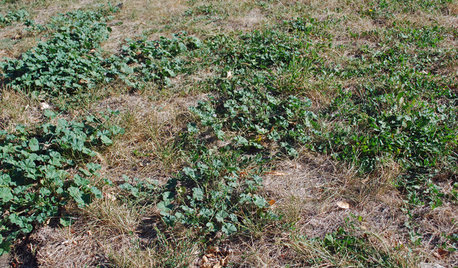
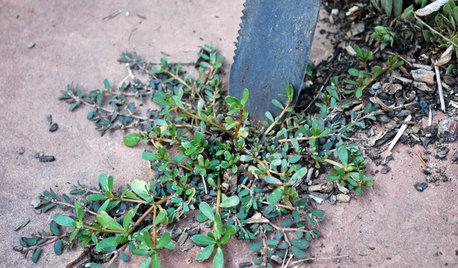




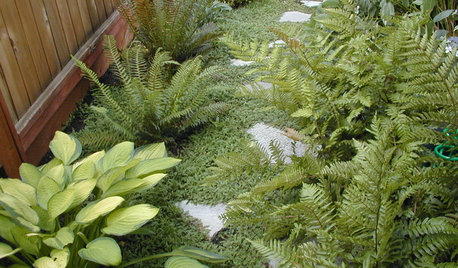

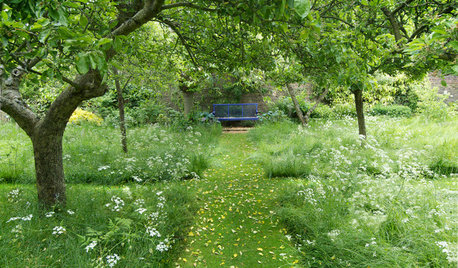







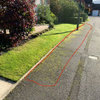
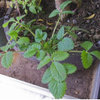
Judy_B_ON